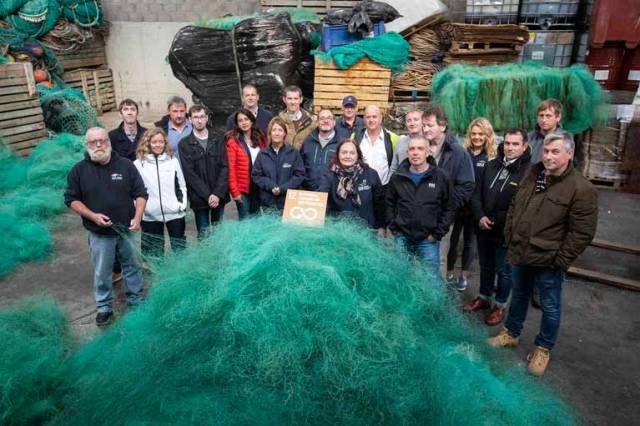Bord Iascaigh Mhara (BIM), Ireland’s seafood development agency, and the Irish South and West Fishermen’s Producers Organisation (ISWFPO) co-hosted a net management workshop in Castletownbere, West Cork this month. The aim of the day-long event, attended by a cross -section of the Irish seafood sector and auxiliary industries, was to track the ‘journey’ of fishing gear from its initial entry into the market to its end of life or ‘retirement’. The workshop also looked at ways to better analyse and understand the source of marine litter brought ashore by the Irish catching fleet today.
New plastics and circular economy polices underpin emerging trends in sustainability. They require member states to minimise the impact of plastics on the environment and to increase the opportunities for used plastics to be recycled and retained instead of ending up on a landfill.
As of October 2019, a total of 224 fishing vessels are registered to Fishing For Litter (FFL). The national programme, where fishing vessels voluntarily collect and take ashore all marine litter they collect during normal fishing activities at sea, forms part of the wider Clean Oceans Initiative. The application of circular economy principles is key to the new national initiative to reduce marine waste so that fishing vessels can develop new ways to record, log and make an inventory of gear and marine waste. To date, 49 vessels are registered to Fishing for Litter in the port of Castletownbere. This represents one fifth of the national fleet.
“The local determination to demonstrate their fishing gear management is outstanding. Other key stakeholders such as the harbour management, net makers are also behind the objective and are keen to help communicate and validate the responsible approach taken by the large majority in Castletownbere”, said Patrick Murphy, CEO, ISWFPO.
The EU Commission is currently developing new ways to monitor and report fishing gear, from being placed on the market to its retirement. The Commission is also exploring ways to better analyse marine litter. The final report will be available in July 2020.
BIM’s establishment of the Fishing for Litter programme in 2015, supported by the European Maritime and Fisheries Fund, has given Ireland a head start. The state agency for the development of the seafood sector is also working on ways to improve the characterisation of waste and marine litter. Progress in this area will ultimately lead to stronger insights about marine waste. BIM has also been handling end of life gear aspects since 2006. However, the new EU directives and polices on plastics will give a new impetus to addressing end of life gear.
“Demonstrating the responsible management of our gear at its end of life is a priority. A full trawl gear could have up to a 10-year life span and is an expensive key piece of equipment. We are keen to work with BIM to identify how best to monitor and record our gear efficiently and to demonstrate this objectively”, explained ISWFPO chairman, Damien Turner.
In September 2015, the General Assembly of the United Nations adopted the 2030 Agenda for Sustainable Development. It comprises 17 Sustainable Development Goals (SDGs). BIM was recently appointed an SDG champion for four of the goals, two of which are particularly relevant where plastics and marine waste are concerned; SDG 14( Life Below Water; a target of which is to help prevent and reduce marine pollution) and SDG12( application of environmentally sound management of all waste through their life cycle).
“The aim of the Champions programme is to raise awareness of the SDGs and to show through the example of the Champions that everyone in society can make a contribution to achieving the 17 Goals. The catching sector is a key contributor to ensuring that we can improve the outcomes for Life Below Water and maximise the lifecycle and recoverable costs of plastics used by the catching sector, the Clean Oceans Initiative will be instrumental in delivering on these SDGs ”, explained Catherine Barrett, BIM.
Representatives from two EU funded projects, ‘Blue Circular Economy’ and ‘Circular Seas’, tasked with creating opportunities for end of life fishing gear, also attended the workshop in Castletownbere.


























































